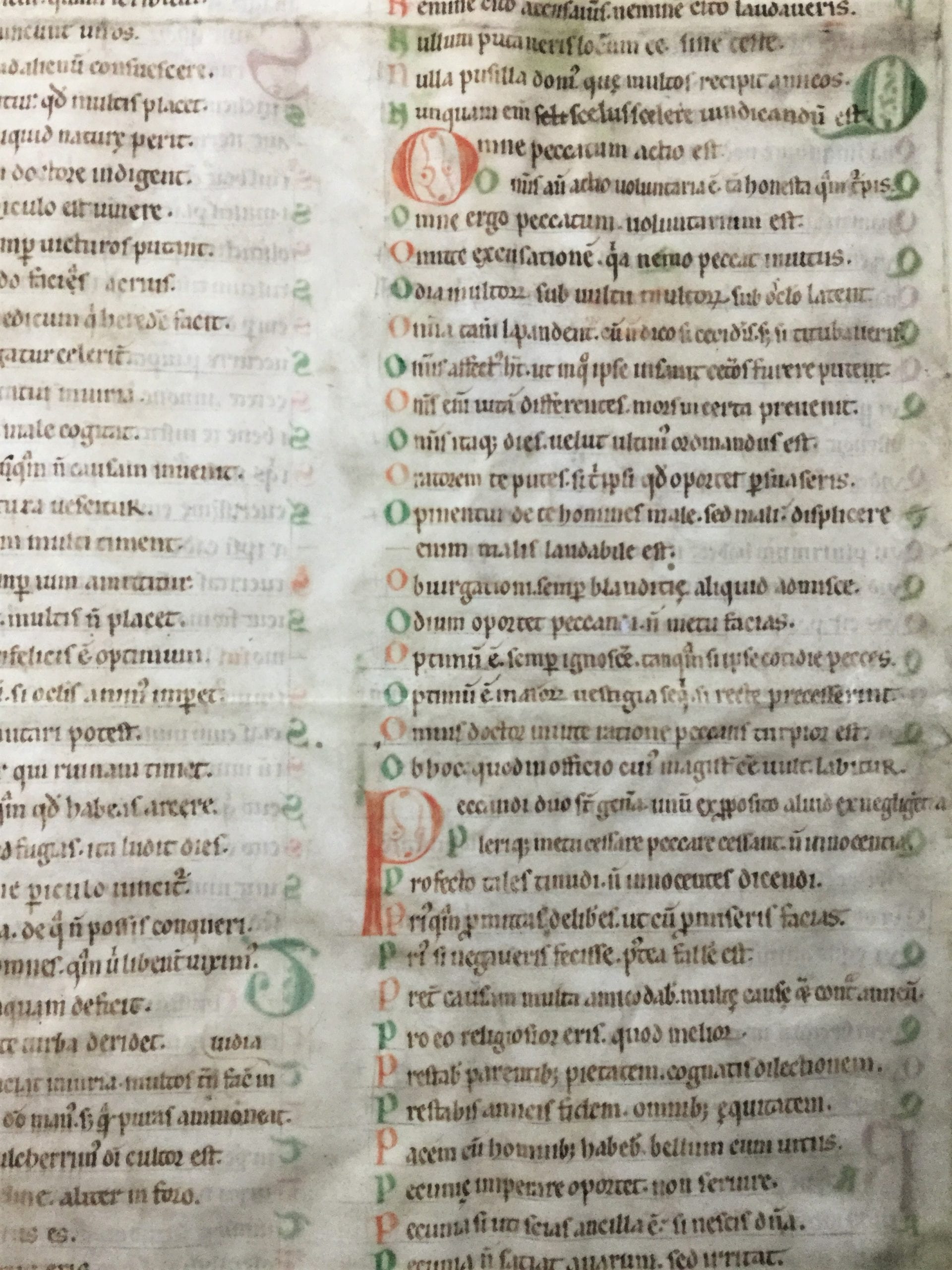Close-up of a leaf from a 12th-century bifolium from André Simon’s library – transcription of text by Publilius Syrus. Courtesy of bookseller Ben Kinmont.
12th Century Manuscript from the Library of André Simon
The UC Davis Library has a respected collection of wine books and manuscripts published before 1900, many of which have been digitized. One of the most recently acquired early manuscripts — and now the earliest wine manuscript in the Library’s collections — is a 12th-century bifolium from the library of the legendary wine merchant, gourmet, and wine writer André Simon (1877–1970), whom wine writer Hugh Johnson called the “charismatic leader of the English wine trade for almost all of the first half of the 20th century, and the grand old man of literate connoisseurship for a further 20 years.”
Simon was a prolific collector of works on food and wine, and his library was considered one of the finest collections of books on gastronomy in the 20th century. He wrote two bibliographies on wine, one on gastronomy, and many works on the history of the wine trade and on gastronomy in general.
The history and description of the bifolium is taken from the catalogue of the seller, Ben Kinmont. With thanks to Mr. Kinmont for the image too.

Provenance (origin)
Both leaves are marked with the name “Abbey de Cercamp.” The Cistercian Abbey of Cercamp was founded in 1141, and Kinmont suggests that the manuscript was written for the use of the abbey’s monks in the later part of the 12th century. No other manuscript or fragment from the abbey is known to have survived.
About the Leaves
The first leaf contains text from two pages from the final book (XX) of Saint Isidore of Seville’s Etymologiae, an early seventh-century encyclopedia structured around the origins of various words in Latin and a survey of important knowledge and learning from the ancient world. Isidore (560–636)* compiled texts from more than a hundred sources, including Pliny the Elder, Solinus, Cassidorus, and Servius. Book XX of the Etymologiae is titled De domo et instrumentis domesticis and offers readers insight into early gastronomic history.
The manuscript covers a range of culinary topics including bread and cakes, meat and sausage, fish, broth, honey, cheese, milk, various sauces, vinegar, beer, and wine, and has passages on the health properties of different foods as well as general recommendations about diet.
The second leaf is from the Sententiae, by Publilius Syrus, a first-century B.C. slave-turned-author. An alphabetical list of aphorisms, the Sententiae were popular from antiquity through the Middle Ages and were often incorporated into later texts. This manuscript features entries from the letters M through T. In his description of the manuscript, Kinmont notes that since each section lacks most of the adages, the scribe who copied the portion likely was working from a fragmentary manuscript.
From the Text of Etymologiae
Children, young people, and adult men and women burn from within themselves, and foods that increase their heat are poison, and they should eat cold things to bring good health. Elderly people, on the contrary, who are sick with cold and phlegm, should eat warm foods and old wine. (column 2, lines 22–23)
Wine is so called because a drink of it replenishes the veins with blood quickly. It is also called Lyaeus because it loosens our cares. (column 2, lines 32–34)
Growing girls should not drink wine because of their body’s heat, if they drink it they die. For this reason, Roman women…only drink wine on specific ritual days. (column 2, lines 34–36)
Pure, unmixed wine is called merenda after the word for midday, because that is when people take naps alone. (column 2, lines 34–36)
The word for leavening comes from the Greek word for fury, because it cannot be contained. (column 1, lines 42–44)
Lard comes from the word for home, because it is kept inside the house. (column 1, lines 42–44)
Offal comes from the word for teeth, because you can silence a barking dog by throwing it into his mouth. (column 1, lines 42–44)
Cooking instructors call jus (broth) by the word for law because it is the determining factor in the seasoning of cooking. (column 1, lines 42–44)
In ancient times, people believed that honey was formed in dewdrops, and that honey from Sardinia is bitter because the island’s bees eat wormwood.(column 2, lines 11–13)
———
Fun fact: In 1997 Pope John Paul II declared Isidore of Seville the patron saint of the Internet because he tried to record everything ever known in his encyclopediae.
This post is part of Archives and Special Collections’ Food and Wine Wednesdays series. Every Wednesday through February, we’re sharing something from our food and wine collections, whether it be a recent acquisition, an interview, a unique manuscript, a rare book, ephemera from the archives, or an upcoming event. Feel free to share your thoughts and feedback with us!